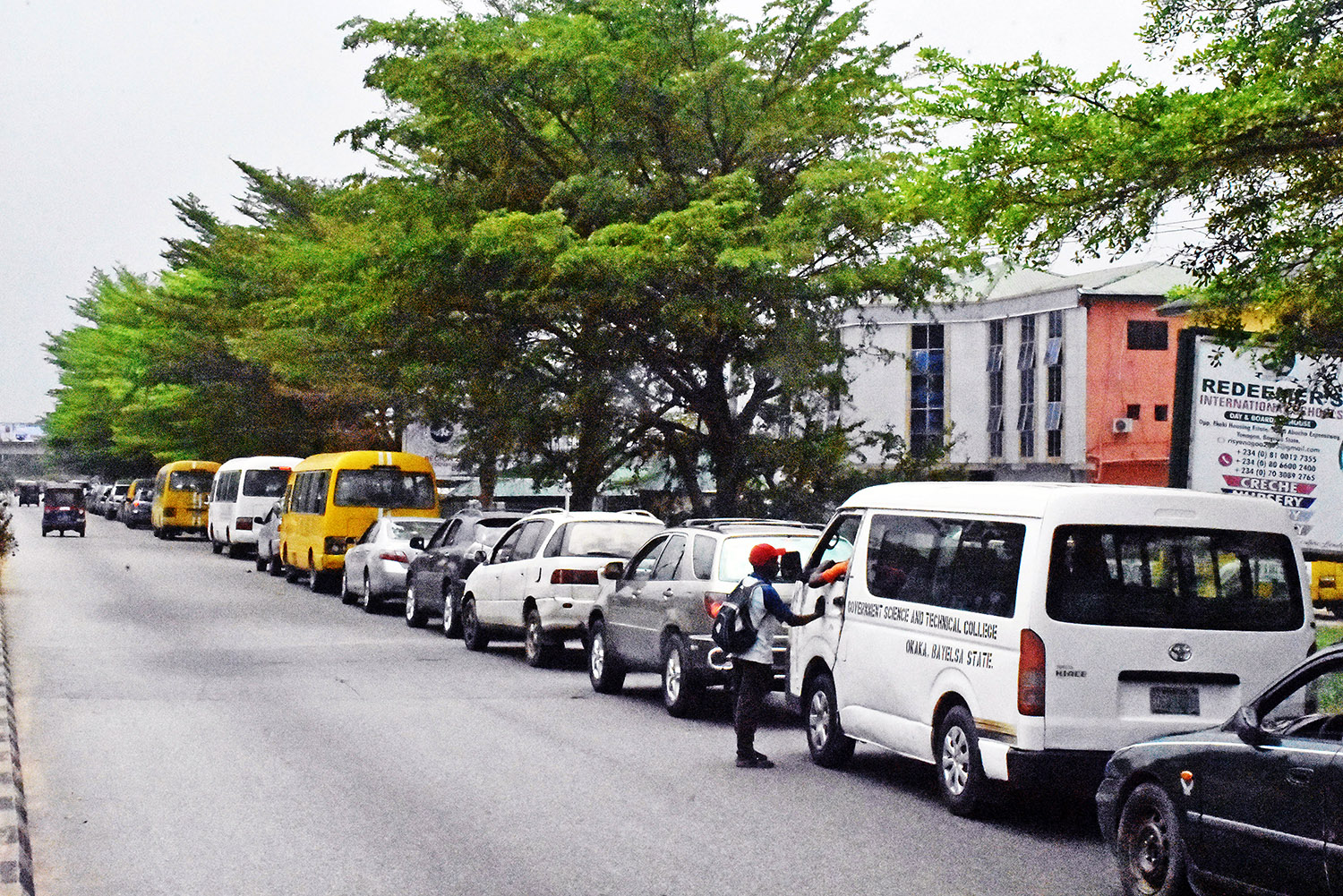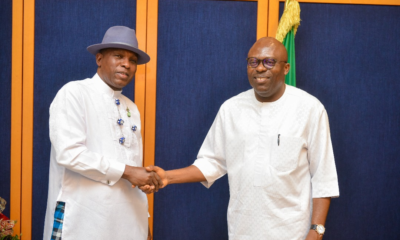Business
How Organised Smuggling Thrives At Seme Border
In 2007, Nigerian Customs Service (NCS) established an office at Cotonou in Benin Republic to monitor and assist their Benin counterparts in checking contrabands coming in as ETLS goods but today the reverse is the case. The good initiative of the then Comptroller-General, Elder Buba Gyang is not yielding any results considering the rate of influx of such contraband goods through the busy Seme border.
Just like Shaki in Oyo State and Idiroko in Ogun State, Seme is the border between Nigeria and Benin Republic and is unarguably the busiest of the three borders.
Importers of Nigeria-bound goods through the Cotonou Port now see Seme as a most viable entry point either for duty evasion or concealment of prohibited items. Most items that fall under the Federal Government’s import prohibition list or as statutorily barred from entering the country through the land borders find their way in through Seme.
The Tide investigation reveals that these items come in trickles and in bulk depending on who is bringing them into Nigeria. The volume of the imports for which revenue is lost on the part of the government may far outweigh the generated revenue and create an adverse effect on government policy to encourage local production of some of the products.
Our investigations also revealed that there are also unmanned areas that present a blank cheque situation to smugglers. These areas are not policed by Customs men either for fear of confrontation by die-hard smugglers or Customs men who chose to look the other way after compromising their positions for smugglers to have a field day.
The film trick of textile seizures at Seme border is a tip of the iceberg as assorted clothings are brought into Alaba market on a daily basis.
This development may have contributed adversely to the massive loss of job that has hit the nation’s once vibrant textile industry.
Over 90 per cent of the membership of the National Union of Textile Garment and Tailoring Workers (NUTGW) have been lost to the menace of smuggling and the textile industry is close to dying in Nigeria.
The 100 road blocks by Federal Operations Units Zone A (South West) Customs has not helped as prohibited clothing flood our markets.
Textile merchants besiege Alaba Rago daily to take delivery of consignments of different types of clothing.
Ironically, it is noted for being one of the most viable border stations in Nigeria with a high revenue generation profile and increasing volume of seizures, other things that happen behind the scene leave much to be desired.
From the large-scale concealment in trucks purportedly laden with dutiable goods to the fleet of vehicles under prohibition and smuggled items that come in under the cover of darkness, Seme border is indeed a place to watch, if the economy of the nation must be protected.
An instance is the effect of rice smuggling on the Nigerian economy. Local rice merchants, under the aegis of Rice Millers, Importers and Distributors of Nigeria (RMIDN) have often expressed displeasure over the upsurge in the smuggling of rice into Nigeria through Cotonou, Republic of Benin.
According to RMIDN, Nigeria has lost an estimated N50 billion as a result of rice smuggling.
Most Indian and Thailand rice that are imported into Cotonou find their way to Nigeria illegally with Seme border serving as gateway to the highest degree of these illicit imports.
Some Nigerian dealers on the product aver that about 5000,000 metric tones of rice are smuggled into the country through Benin annually. This trend is frustrating to Nigerians who have invested massively in rice production and legitimate importation through approved seaports after paying appropriate duty charges into government coffers.
Local production of this grain will remain imperiled except a closer tab is placed on Seme border and other possible areas of leakage as stakeholders in the genuine rice business now see that entry point is their major threat.
A source close to the borders, who prefers anonymity, told The Tide that the government has however not shown commitment in its resolve to make its policy on rice work.
He explained that price differential between imported rice smuggled into Nigeria through Cotonou and the ones that come through the approved Nigerian seaports are as high as N2,000. He argued that the need for the government to review Nigerian port charges to make them competitive with the Cotonou port has become imperative.
This price differential has not helped the government’s purported drive to stop smuggling. The much talked about Common External Tariff (CET) has also not been able to address this trend.
Smugglers and buyers rendezvous for rice coming through Seme are the Alaba-Rago Market, Iyana –Era, Iyana-Iba, all located on the Lagos –Badagry expressway and other parts of the country.
The volume of poultry products through the border is no doubt far from abating. Whereas, the command attempts to destroy seized poultry products particularly frozen chicken and turkeys, a glaring fact remains that these poultry products flood our local markets having found their way from Cotonou to Lagos.
The retaining of the poultry products to direct consumers start from Seme to every other part of Lagos. Some smugglers break their bulk at the borders while others ship them as far as Port-Harcourt and the entire South Eastern states.
At Mazamaza, a popular inter-state motor park for South East bound luxury buses, there are buses waiting to ship as much as 6000 cartons of poultry products to Port Harcourt, Aba, Owerri enroute the South East.
The Tide finding can authoritatively reveal that a consignment of about 600 cartons of poultry products shipped in a bus could belong to about 2 to 3 persons. Over six of these big buses leave Lagos for various destinations on daily basis.
Some turkey and chicken laden buses also do transporting in textile materials, used tyres that come in through the connivance of some officials of the Customs Services.
Some of these contraband laden buses get seized while in transit out of Lagos by men of the Federal Operation Units of the Customs. These seizures have often times been paraded by Comptroller Victor Dimka, the F.O.U Zone A. comptroller.
Along the Lagos-Badagry Expressway, precisely at two points-Gbaji and Agbara, Customs officials manned check points and collect various sums from smugglers before allowing their goods in. These checkpoints are jointly mounted by the resident officers of Seme border Customs and Federal Operation Unit.
It therefore, becomes ironical when goods for which “settlement” was paid to Customs at the Seme Border, Gbaji Bridge and Agbara get seized by F.O.U.
Aside the issue of compromise on the part of the Customs, there is also the factor of negligence due to the lack of Customs presence in places like Fara Seme and Ponraele. Fara –Seme, a border town is dreaded by government agencies. This has resulted to the place becoming a route for unfettered smuggling activities.
Ponraele, from our investigation, is a rendezvous for dare –devil smugglers that may resolve to confront Customs forces, should there be an attempt by the Customs to stop their operations. It is in fact a storage point for large-scale consignment before they are shipped into the country at night or concealed with dutiable items by day after “settlement”.
Operatives of the Customs avoid going close to Ponraele for the purpose of performing the enforcement functions except those who go to indulge with the smugglers for the purpose of mapping out strategies and taking of hard drugs like Indian hemp.
Outside of these functions, the Seme command of Nigerian Customs Service tends to have enshrined in its duties other acts that are anti-people and other vices capable of devastating the economy which they are established to uplift.
Business
Fuel Scarcity: IPMAN threatens shutdown over bridging claims

The Independent Petroleum Marketers Association of Nigeria (IPMAN) Depot Chairmen Forum, has exonerated its members from the current fuel scarcity in the country.
According to IPMAN, this is caused by its inability to source petroleum products.
The IPMAN Depot Chairmen Forum also threatened to withdraw its services over non-payment of N200 billion bridging claims by the Nigerian Midstream and Downstream Petroleum Regulatory Authority (NMDPRA) to its members, since 2022.
Alhaji Yahaya Alhassan, the Chairman, of the Forum said this while briefing newsmen in Abuja, yesterday.
Alhassan said the Nigerian National Petroleum Company Limited (NNPC Ltd.) was the sole importer of the product, but the marketers could not source products from NNPC Ltd. deport, rather from the private depots at high rate.
“We cannot buy fuel from the private depots at N950 and transport the product from Lagos to the North and other parts of the country with N2 million and still sell it at N900 or N1, 000.
“It is expedient for us to state that we are more pained by the non-availability of petroleum products in the country, which has given rise to another round of untold hardship for Nigerians.
“Contrary to claims that IPMAN members are hoarding Premium Motor Spirit (PMS) known as fuel, we would like to categorically state that PMS scarcity is wholly triggered by inability to get fuel from NNPC and not IPMAN,’’ he said.
Meanwhile, the NNPC Ltd. Chief Corporate Communications Officer, Olufemi Soneye said the disruption was due to logistical issues which had since been resolved.
“We currently have an availability of products exceeding 1.5 billion litres, which can last for at least 30 days. Unfortunately, we experienced a three-day disruption in distribution due to logistical issues, which has since been resolved.
“However, as you know, overcoming such disruptions typically requires double the amount of time to return to normal operations.
“Some folks are taking advantage of this situation to maximise profits. Thankfully, product scarcity has been minimal lately, but these folks might be exploiting the situation for unwarranted gain,’’ Soneye said.
He however, said the lines would clear out soon.
On the non-payment of bridging claims, the IPMAN forum said it was distressed and depressed by the laidback attitude of the NMDPRA towards the survival its member’s businesses, arising from its refusal in paying the claims.
“It is with deep frustration that we have assembled here today as the IPMAN Depot Chairmen Forum. It is also disheartening to note that some of our members have completely shut down businesses and retrenched employees.
“As businessmen and women, our members acquired bank loans to keep their fuel retail outlets running on a daily basis across the nooks and crannies of Nigeria in order to serve the teeming population of Nigerians,’’ Alhassan said.
He recalled that Sen. Heineken Lokpobiri, Minister of State Petroleum Resources (Oil), at a stakeholders meeting in February mandated the NMDPRA management to clear the entire debt in 40 days.
“However, today, we have crossed the 40 days’ time lapse given to the NMDPRA to clear the debt, and it is shameful to state that only the paltry sum of N13 billion has been paid, ignoring minister’s directive.
“We are not happy with the indiscriminate increment in the issuance and renewal of Sales and Storage Licence, by the NMDPRA, and the subsequent delays in acquiring the licence, which our members are recently subjected to.
“We are also calling on President Bola Tinubu to look into this unwholesome figure which is highly detrimental to our business and reverse it forthwith, as it is bound to impact negatively on the masses.
“We are poised to take far reaching decisions that may cripple the supply and sales of petroleum products across Nigeria if our demands are not met within the shortest period of time.
“We are collectively prepared to withdraw our services, shut down every single outlet, and suspend lifting of products forthwith till our demands are fully met, and the consequences will be terrible.
“We call on our members to however remain resolute and law abiding, even as we draw close to the immediate ultimatum for our demands to be met by the NMDPRA,’’ the chairman said.
Reacting to the IPMAN’s claims, the Acting Head, Corporate Communications, NMDPRA, Seiyefa Osanebi said the bridging claims payment was ongoing.
“The bridging claims payment is always an ongoing process,” she said.
Maritime
Shippers’ Council Registers 160 Port Operators

The Nigerian Shippers Council (NSC) says it has registered 160 Port stakeholders into its Regulated Port Service Provider and Users platform since the initiative began in 2023.
Executive Secretary, NSC, Mr Pius Akutah, made the disclosure on the sideline of a sensitisation programme by the commission for port operators in Lagos, with the theme, “Regulated Port Service Provider and Users”.
Represented by the Director, Consumer Affairs, Chief Cajetan Agu, Akutah emphasised the significance of the programme for stakeholders.
He said the sensitisation programme was the second edition after its commencement during the last quarter of 2023.
The Secretary said the 160 registered port operators consist of agencies, terminal operators, shipping companies, individual port users as well as service providers.
“We invited the ports stakeholders for enlightening them on the processes for online registration of Regulated Port Service Provider and Users.
“We have demonstrated to them how to register and how to make payment and we were able to present before them the various categories of the registration.
“The rate of payment is also in the registration. The payment of each group depends on the operation. A shipper pays N30,000, terminal operators and shipping companies pay N300,000, truckers also pay N30,000, while some pay N50,000 and N100,000.
“The Council was able to intimate them on the benefits, because port users benefit more as we help to interface on reducing port charges from time to time”, Akutah said.
He said that there was a need to continue to work with port operators to stop delays and eliminate high costs to make the port efficient.
Also speaking, the Deputy Director, Stakeholders, Service, NSC, Mr Celestine Akujobi, said “the sensitisation exercise was important for the council to enable us bring all the port stakeholders together”.
According to him, this is to avoid challenges during the implementation of the council’s responsibilities.
“By the time we introduce sanctions on defaulters, no operators will complain that he or she is not aware of the registration.
“I’m happy with the turnout of this sensitisation. This shows that the operators are well informed of the statutory friction of the council as the port regulator.
“The final implementation will commence as soon as we discover that all the operators have keyed into the portal.
“We are engaging other ports across the country and we’re hopeful that before the last quater of 2024, the council will implement sanctions on defaulting operators”, Akujobi said.
Earlier, Vice Chairman, National Association of Government Approved Freight Forwards (NAGAFF), Dr Ifeanyi Emoh, said port challenges were enormous, adding that they originated from some of the government agencies.
Emoh urged the council to look into regulating other government agencies, so that there could be a window through which they can collect port charges collectively instead of indiscriminately.
By: Chinedu Wosu
Business
Chivita, Hollandia Reward Outstanding Trade Partners At Annual Conference

Chivita| Hollandia (CHI Limited) leading fruit juice and value-added dairy manufacturer in Nigeria has rewarded its long standing distributors at the recently held 2024 Distributor Conference. The event with the theme, “Break Boundaries Exceed Expectations” served as a platform to recognise and reward the exceptional contribution of the distributors and wholesalers who play a critical role in Chivita|Hollandia (CHI Limited) success and business goals for the year.
The Distributor Conference was held in two sessions. While the morning session featured keynote addresses, industry insights and brand immersion experience, the evening session was a cultural display of elegance and funfair that culminated in the award presentation and recognition of the contribution the trade partners made to the company in the 2023 year under review.
A key highlight of the event was the award ceremony which acknowledged outstanding trade partners in various regions across the country. The awards recognized commitment, dedication, and outstanding performance in areas of sales growth, brand promotion, and market expansion.
Eelco Weber, Managing Director, Chivita|Hollandia (CHI Limited), stated that the company’s success story is incomplete without the strong partnerships it has built with trade partners. “Today, we celebrate not only the achievements, but the collaborative spirit that has made our growth possible” he said.
Bola Arotiowa, Chief Commercial Officer, Chivita|Hollandia (CHI Limited), in his statement revealed that, the event which was first of its kind will continue to be an annual meeting to enable the company work more closely with its distributors, share insights and action points, help the trade partners familiarize themselves with the company’s goals and objectives for each year, and serve as a driver for mutual success.
“Our distributors are the backbone of Chivita|Hollandia (CHI Limited). Their relentless efforts in distributing our products, promoting our brands, and expanding our reach across the nation is truly commendable. As the bridge between us and our valued consumers, it is very important to reward their hard work and dedication for being an essential part of the Chivita|Hollandia (CHI Limited) family. Together, we will continue to deliver great products to our conusmers which in turn will deliver value to them”, Mr. Arotiowa added.
Speaking at the conference, HajiyaBilikisuSaida, Chief Executive Officer of Smabirm Nigeria Limited, who won the Outstanding Distributor of the Year in North 1 region, and got a reward of two million Naira worth of Chivita|Hollandia (CHI Limited) products expressed delight at the company’s recognition, and stated that the awards served as a way to inspire distributors to do more and put in more effort, which in turn would help both the distributors and the company to grow.
Other outstanding performance distributors of the year rewarded with a two million Naira worth of Chivita|Hollandia (CHI Limited) stock include, Sunny Chuks Limited for East 1 region, MRS FA & Sons Limited for East 2 region, Hussakas Ventures for North 2 region, Rookee 1388 Ventures for Lagos 1 region, Pik N Pil Ventures for Lagos 2 region, FaithJoe Event Management Limited for West 1 region, and Progress Family Nigeria Enterprise for West 2 region.
The annual Distributors Conference aims to strengthen the bond between Chivita|Hollandia (CHI Limited) and its trade partners. This collaborative approach fosters mutual growth and ensures the continued success of the brands in the Nigerian market.
-
News5 days ago
FG Flags Off PH-Aba Train Service
-

 Featured5 days ago
Featured5 days agoDraw Up Futuristic Policies To Strengthen Governance, Fubara Tells NISS Team …Says Rivers’ll Deploy AI To Drive Dev, Tackle Political Crisis
-
News5 days ago
Drama As Senators Jostle For Seats In Newly Renovated Chamber
-

 Niger Delta5 days ago
Niger Delta5 days agoDiri swears in 14 Commissioners, Revenue Chairman
-

 Nation5 days ago
Nation5 days agoVCDF in Partnership with LDSVA Sensitise Women on Gender Equality, Financial Literacy & Entrepreneurship
-

 Niger Delta5 days ago
Niger Delta5 days agoObaseki Approves N70,000 Minimum Wage For Workers
-
Niger Delta5 days ago
Ministry Of Health Decorates Odu As End Malaria Champion In Rivers
-

 Niger Delta5 days ago
Niger Delta5 days agoGroup Dismisses Call For NDDC MD’s Sack … Passes Confidence Vote.

